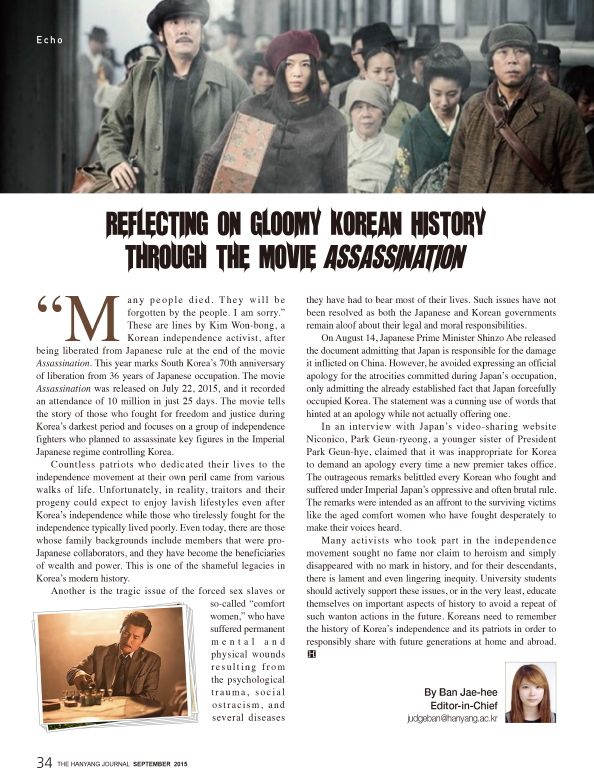
“Many people died. They will be forgotten by the people. I am sorry.” These are lines by Kim Won-bong, a Korean independence activist, after being liberated from Japanese rule at the end of the movie Assassination. This year marks South Korea’s 70th anniversary of liberation from 36 years of Japanese occupation. The movie Assassination was released on July 22, 2015, and it recorded an attendance of 10 million in just 25 days. The movie tells the story of those who fought for freedom and justice during Korea’s darkest period and focuses on a group of independence fighters who planned to assassinate key figures in the Imperial Japanese regime controlling Korea.
Countless patriots who dedicated their lives to the independence movement at their own peril came from various walks of life. Unfortunately, in reality, traitors and their progeny could expect to enjoy lavish lifestyles even after Korea’s independence while those who tirelessly fought for the independence typically lived poorly. Even today, there are those whose family backgrounds include members that were pro-Japanese collaborators, and they have become the beneficiaries of wealth and power. This is one of the shameful legacies in Korea’s modern history.
Another is the tragic issue of the forced sex slaves or so-called “comfort women,” who have suffered permanent mental and physical wounds resulting from the psychological trauma, social ostracism, and several diseases they have had to bear most of their lives. Such issues have not been resolved as both the Japanese and Korean governments remain aloof about their legal and moral responsibilities.
On August 14, Japanese Prime Minister Shinzo Abe released the document admitting that Japan is responsible for the damage it inflicted on China. However, he avoided expressing an official apology for the atrocities committed during Japan’s occupation, only admitting the already established fact that Japan forcefully occupied Korea. The statement was a cunning use of words that hinted at an apology while not actually offering one.
In an interview with Japan’s video-sharing website Niconico, Park Geun-ryeong, a younger sister of President Park Geun-hye, claimed that it was inappropriate for Korea to demand an apology every time a new premier takes office. The outrageous remarks belittled every Korean who fought and suffered under Imperial Japan’s oppressive and often brutal rule. The remarks were intended as an affront to the surviving victims like the aged comfort women who have fought desperately to make their voices heard.
Many activists who took part in the independence movement sought no fame nor claim to heroism and simply disappeared with no mark in history, and for their descendants, there is lament and even lingering inequity. University students should actively support these issues, or in the very least, educate themselves on important aspects of history to avoid a repeat of such wanton actions in the future. Koreans need to remember the history of Korea’s independence and its patriots in order to responsibly share with future generations at home and abroad.

이 기사를 공유합니다

